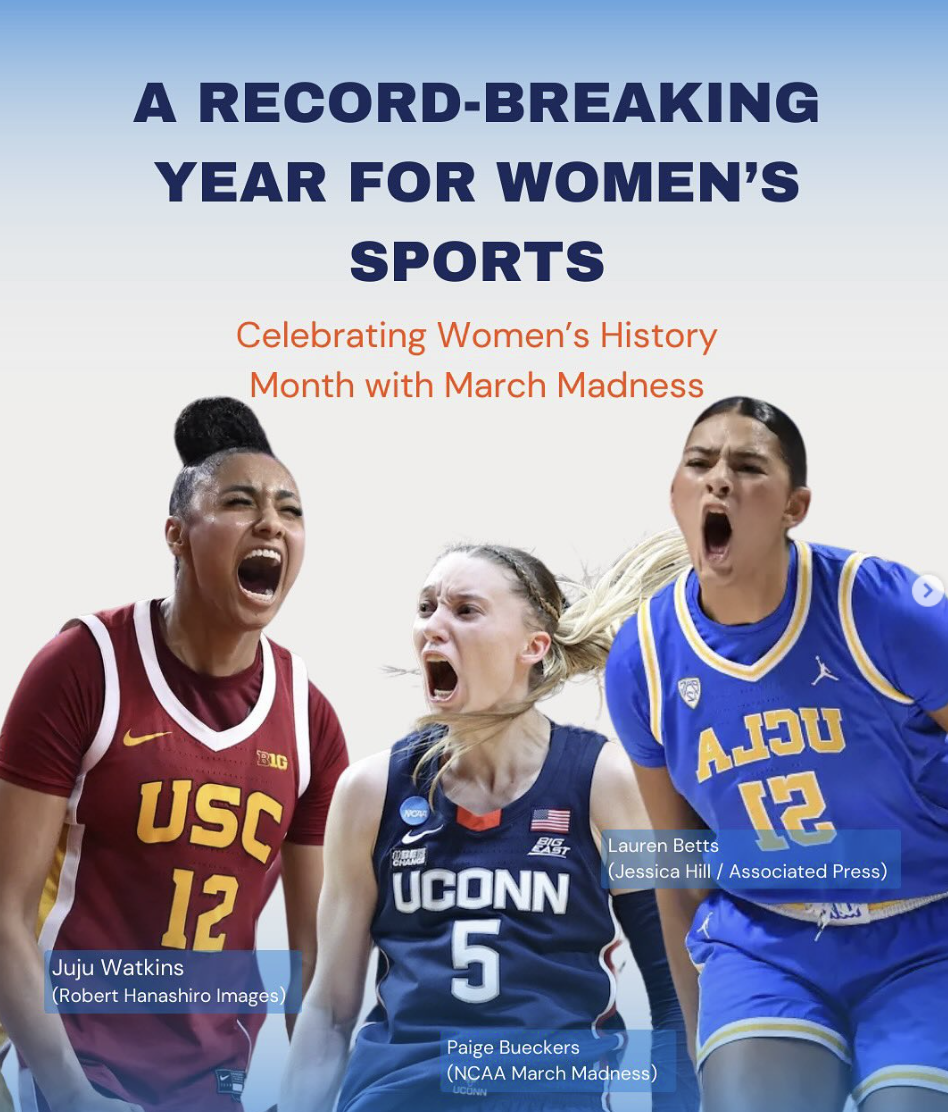A Historical Year for Women’s Sports: Celebrating Women’s History Month with March Madness

By Kai Jefferson, CSW|Barbra Streisand Communications Student Worker
March Madness is one of the most exciting times in sports, and this year, it’s especially historic for women’s sports. As we celebrate Women’s History Month, it’s crucial to highlight the growth, achievements, and challenges of women in athletics, particularly in the NCAA women’s basketball tournament.
A Major Milestone for Women’s Basketball
After 40 years of competition, the NCAA women’s basketball tournament finally earned the official “March Madness” branding in 2022. This milestone symbolizes the growing movement toward gender equality in sports and the increasing recognition of female athletes. This branding was long overdue, as it aligns the women’s tournament with the prestige and excitement traditionally associated with the men’s tournament.
Even more significant, as of 2025, women’s college basketball teams will start receiving financial compensation for participating in March Madness. Teams will be awarded $15 million, which is set to increase to $25 million by 2028. This represents an essential step toward leveling the playing field for female athletes, who have long fought for recognition and fair compensation.
The Persistent Inequities in Women’s Sports
While progress has been made, the road to equality in women’s sports is still riddled with challenges. A 2024 global survey of 14,000 people across seven countries revealed some stark disparities. While 73% of respondents reported watching women’s sports (only 8% fewer than those who watch men’s sports), 64% felt that professional women’s sports lack sufficient media coverage. Additionally, 88% agreed that professional women athletes serve as impactful role models, showcasing the value and influence they bring to sports culture.
Despite this growing viewership and support, inequities persist, especially in pay. Elite women’s sports are expected to generate over $1 billion in revenue within the next three years, marking a 300% increase. Yet, a global sports salary survey by Sporting Intelligence found that women athletes, on average, earn only 1% of what men earn. There were also, no women featured on Forbes’ 2024 list of the 100 highest-paid athletes globally.
In fact, women’s basketball players in college often earn more through name, image, and likeness (NIL) deals than they will in the WNBA. The average WNBA salary is about $150,000 per season, while NBA players earn an average of $10 million. As a result, many WNBA athletes must rely on brand partnerships or play overseas, where billionaire-backed teams offer higher salaries, as salary caps do not limit their earnings.
Everyone’s Watching Women’s Sports
Despite the ongoing challenges, women’s basketball continues to make history. In 2024, for the first time ever, the NCAA women’s basketball title game garnered more viewers than the men’s game, averaging 18.7 million viewers on ABC and ESPN, with a peak of 24 million. This was not only a record for women’s basketball but also made it the most-watched basketball game, men’s or women’s, since 2019. These historic viewership numbers signal a shift in public interest and recognition of the talent and excitement that women’s sports bring.
Athletes Leading Change: Juju Watkins and Beyond
Women athletes aren’t just making waves on the court, they’re also using their platforms for social change. One standout figure is Juju Watkins, a rising basketball star who has taken her influence beyond basketball. Watkins has been deeply involved in philanthropic efforts, such as her “Good JuJu Holiday Giveback” and her work with the Watts Labor Community Action Committee (WLCAC).
Founded by her great-grandfather, Ted Watkins, a prominent civil rights activist, the WLCAC helps individuals in need in the Watts neighborhood of Los Angeles. Juju proudly carries her family’s legacy forward, using her platform to invest in her community and inspire others. As she stated, “I have a lot of pride in my last name and my family’s history in L.A. I feel like my family, my great grandfather and my grandfather, have done so much for the community that it inspires me to want to take that step and really use my platform for something bigger than just basketball.”
Watkins’ commitment to giving back and making a difference highlights the broader impact of women athletes who are leading change both on and off the court.
How You Can Support Women’s Sports
As we celebrate Women’s History Month, let’s continue to support women’s sports and the athletes making history today. With broken records, thrilling upsets, and inspiring players, this year’s March Madness is sure to be unforgettable.
The Women’s March Madness tournament kicks off on March 19th, and you can catch all the action on ESPN networks, streaming services, and select games on ABC. Let’s tune in and continue to advocate for the recognition and equality that women athletes deserve.
View our Women’s March Madness highlight on Instagram.
Sources:

